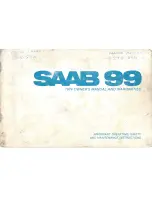
6
7. BRAKE DRUMS
A. Inspect drums for cracks, heat checking, glazing,
grooving, severe out-of-round condition or bell
mouthing (must not exceed .025 T.I.R.). Replace any
cracked drums. It is recommended that drums be
turned at reline to prevent hot spotting and achieve
quicker, more complete burnishing of the new lining.
B. Measure the drum I.D. to be sure the maximum limit
allowed (stamped on drum) has not been exceeded,
due to wear or machining.
8. MANUAL SLACK ADJUSTER
A. Check for cracks in the body and arm of the slack
adjuster.
B. Check for spline wear. The amount of backlash in
the slack adjuster to camshaft should be no more
than .094" measured 6" from centerline of the cam
shaft (See Figure 8).
ASSEMBLY (SEE FIGURE 2)
1. Install the spider onto the axle flange using the five bolts,
three 5/8" studs, lockwashers and nuts. Be sure spider
is properly oriented as noted during disassembly. Tighten
mounting bolts to vehicle manufacturer’s specifications.
2. If cam shaft bushings were removed, replace with new
bushings. Drive into place using Owatonna 630-7 piloted
driver or similar tool, taking care not to damage or distort
the I.D. of the bushings. NOTE: Bushings are located at
each end of cam shaft tube.
3. Install new cam shaft grease seals in the end of the cam
tube and chamber bracket. Use Owatonna 630-7 piloted
driver or similar tool to install grease seals.
CAUTION: The lip of the grease seals must be installed
correctly to prevent possible damage. The lip of the seal
that is installed in the cam end must enter the opening
first. The lip of the seal that is installed in the opposite
end of the cam tube must enter last (See Figure 9).
4. Install the actuator bracket and cam tube onto the spider
using four cap screws and lockwashers. Torque to 70-80
ft. lbs. Secure the actuator to the bracket using the two
nuts and washers. Torque to vehicle manufacturer’s
specification.
5. If removed, reinstall the dust shields. Tighten the six
cap screws and lockwashers to 90-110 in. lbs. torque.
6. Coat cam shaft journals with light film of chassis lube.
Do not coat “S”-cam head. Install the cam shaft into the
cam tube. Be careful not to damage the grease seals.
7. Install the thick cam shaft flat washer, the slack adjuster,
spacers, washer, and a new snap ring in that sequence
onto the splined end of the cam shaft. Adjust end play of
the cam shaft to between .005" and .045" by using the
appropriate number of spacer washers. Make sure the
snap ring is seated into the groove at the end of the
splined camshaft.
.094”
FIGURE 8
- CHECKING SLACK ADJUSTER BACKLASH
6”
C. Check ability to rotate the adjusting nut at least one
complete revolution in each direction. Force required
to rotate the adjusting nut should not exceed 15 ft.
lbs. NOTE: If any of the above conditions are found,
replace the slack adjuster. Do not attempt to repair.
9. AUTOMATIC SLACK ADJUSTERS
A. Consult manufacturer’s service information. (For
information on Bendix Automatic Slack Adjusters,
see Service Data sheet SD-05-1200, formerly
SD-05-2).
10. ACTUATORS
A. Check for cracked housing, loose mounting studs.
B. Check for damage to the push rod, and push rod
boot (if so equipped).
C. Check for broken push rod return spring.
D. Check for excessive wear on yoke, yoke pin, and
slack adjuster yoke pin hole or bushing. There should
be no more than .031 combined free play in these
components.
CAUTION: If the vehicle is equipped with spring
brakes, refer to manufacturer’s instructions. High
spring load, if not handled properly, may result in
serious injury or death may result.
FIGURE 9 -
SEAL INSTALLATION
SLACK ADJUSTER END
NOTE: BOTH LIP SEALS POINT THE SAME DIRECTION LIP
TOWARD SLACK ADJUSTER
LIP SEAL
ACTUATOR BRACKET
AND CAM TUBE
CAM END
LIP SEAL
Summary of Contents for SINGLE ANCHOR PIN CAM BRAKE
Page 11: ...11...






























